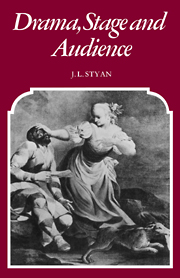1 - Communication in drama
Published online by Cambridge University Press: 02 December 2009
Summary
It is self-evident that a play must communicate or it is not a play at all. We must concur with Peter Brook's fundamental tenet that ‘the choices [a dramatist] makes and the values he observes are only powerful in proportion to what they create in the language of the theatre’ (The Empty Space, p. 35). It may not ‘work’ if it is a bad play as such (The Cenci, The Family Reunion, Camino Real, Tiny Alice) or if it is a non-play (Prometheus Unbound, The Shadowy Waters, The Dynasts). With such intractable material we are not concerned. Kenneth Burke has said, ‘Drama is dissolved by the turn from dramatic act to lyric state’ (A Grammar of Motives, p. 441): and even this is generous because the status may never have been first an actus. But in some circumstances a play of little apparent value (Titus Andronicus, The Rivals, The Colleen Bawn, Charley's Aunt) can work well, and therefore is worth special attention. For we do not ask that a play communicate for ever; we do ask that a play communicate in its own time, through its own medium, for its own community. The task with plays great or trivial is to examine the line of communication, the transmission of signals between stage and audience and back again, the stimulus and the reaction, on the occasion. The first night of Twelfth Night in the Hall of the Middle Temple in 1602 should be no more interesting than its second night in, say, Tokyo.
- Type
- Chapter
- Information
- Drama Stage and Audience , pp. 1 - 30Publisher: Cambridge University PressPrint publication year: 1975



